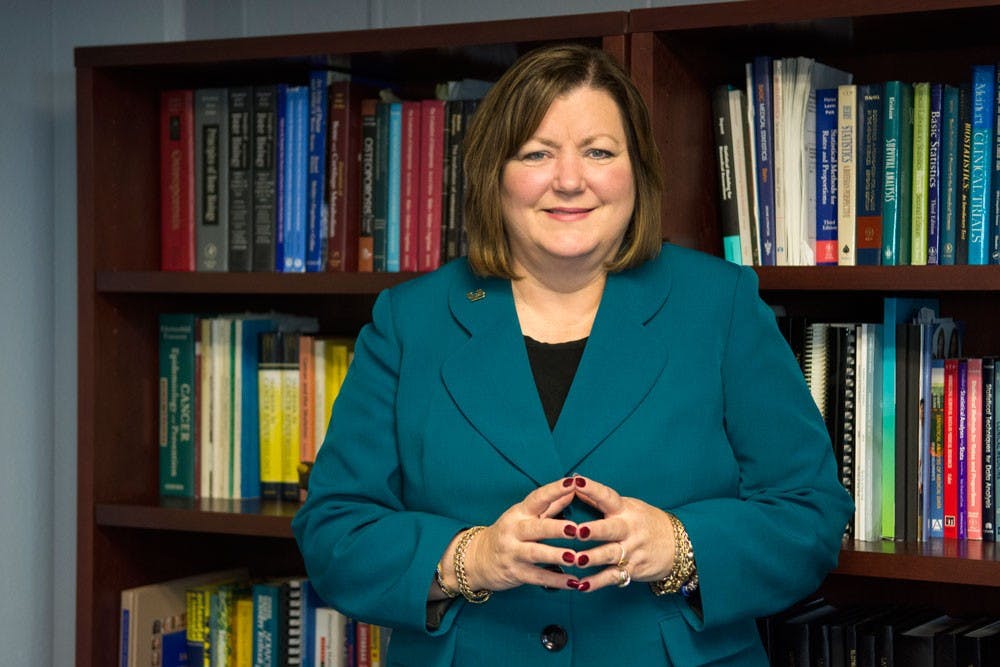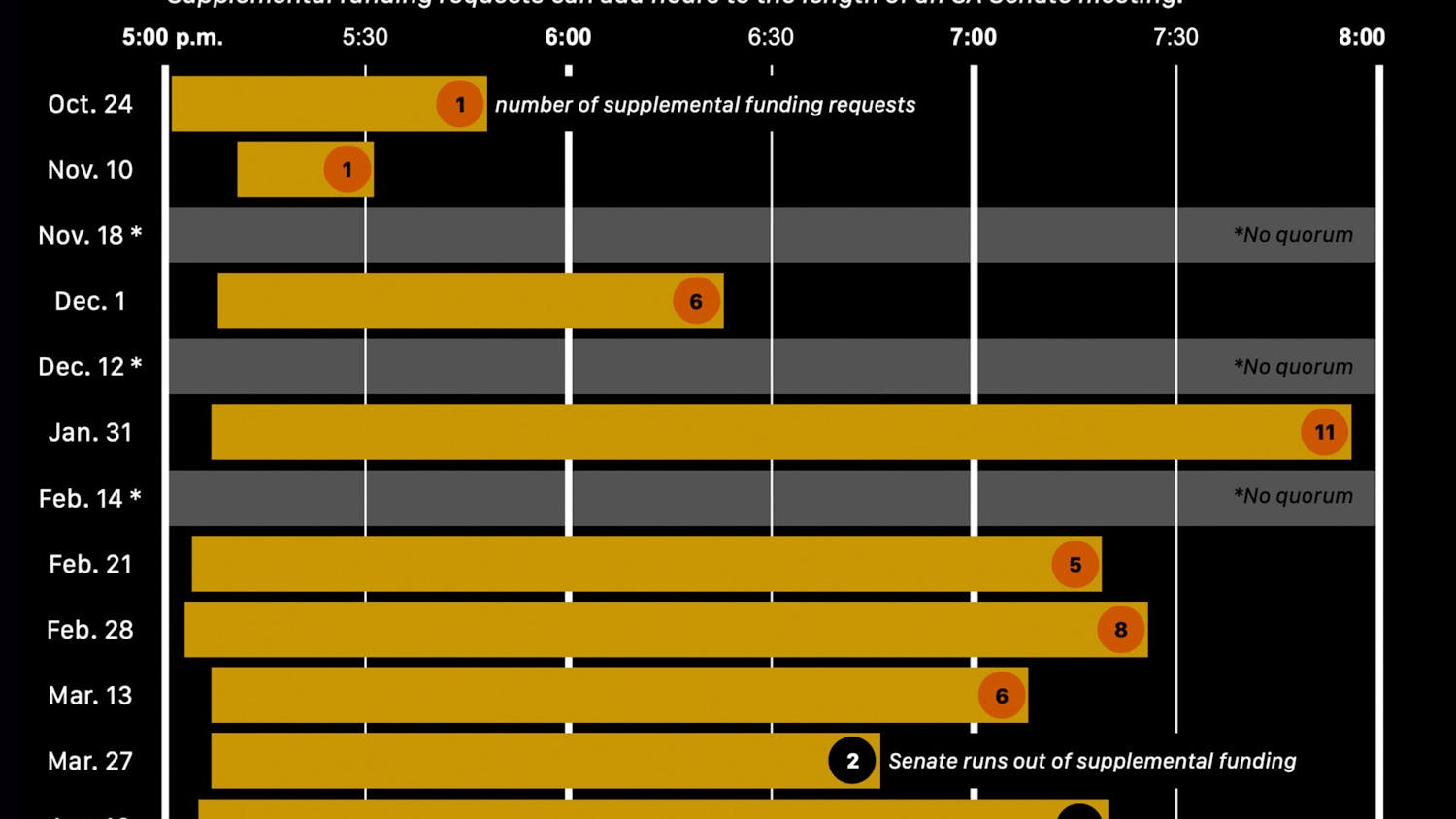Jean Wactawski-Wende said her life changed after she took an epidemiology class.
She had had a fascination with science since middle school, but the decision to take that class ultimately transformed her life, she said.
Wactawski-Wende, dean of the School of Public Health and Health Professions and a SUNY Distinguished Professor, has since devoted her life to epidemiology and cancer research. One of her main studies, The Women’s Health Initiative (WHI), was one of the most comprehensive studies ever done on postmenopausal women and involved many students and faculty.
“The advancement of science is just happening so quickly and there are examples in prevention where we’ve made great strides in prevention of mortality from breast cancer – a lot due to screening and various programs we do,” she said.
Wactawski-Wende has been working at UB for roughly 26 years. Her work is primarily focused on diseases that affect older women, such as cancer and Osteoporosis. She studies factors that are associated with the risk of these diseases and conducts clinical trials that determine prevention.
“One in two men and one in three women will be diagnosed with some form of cancer in their lifetimes, so the work I do can’t be fast enough,” Wactawski-Wende said. “It’s a very devastating disease for many, but there are many ways the early advances and prevention can help.”
Before coming to UB, Wactawski-Wende was born and raised in North Tonawanda – right outside the city of Buffalo. She said it was a great environment to grow up in, since most people knew one another. She studied biology at Canisius College and completed her Ph.D. at Roswell Park Cancer Institute.
From the time she was in high school until she went to graduate school, Wactawski-Wende worked almost full-time in a laboratory as a phlebotomist at a local hospital. She went to work before classes at 6 a.m. and delivered blood samples.
“Overall, I’ve been provided with a lot of opportunities and not so many obstacles,” she said.
She started at UB as an assistant professor and, after serving as interim dean for eight months, was named permanent dean of the School of Public Health and Health Professions in early 2015.
Wactawski-Wende co-wrote “The Women’s Health Initiative” with Maurizio Trevisan, dean of Sophie Davis School of Biomedical Education at the City College of New York, in 1993. The national project has been ongoing for 23 years. It is designed to analyze the common diseases and disorders in older women.
Wactawski-Wende said she will be doing a future study in Buffalo that will be expanding her work in the women who participated in the WHI.
“It’s a really amazing, dedicated group of women. We still get a 96 percent response rate, which is phenomenal because they are truly women that are helping others, which in turn help society,” she said.
Many of UB’s graduate, medical and doctorate students have used the data from the WHI as part of their thesis or dissertation work, and many of the students work as interns in this program.
Xiaodan Mai, a post-doctorate UB student who graduated last year, has been working with Wactawski-Wende for six years.
When Mai first came to the United States from China, she didn’t know how to search for jobs but she said Wactawski-Wende helped her and introduced her to other researchers.
“She is a very talented researcher and is very dedicated to her work, to her students and her family,” Mai said. “She’s a role model who cares about everyone around her. Anytime you need her, she’s there to support you.”
Joshua Gordon, a second-year Ph.D. student studying epidemiology who is also in his fourth year in the Medical Science Training Program, started working with Wactawski-Wende in 2014.
Gordon said Wactawski-Wende is “incredibly smart, thoughtful, and passionate.”
He said he enjoys working with her and that she is not only a top researcher, but she’s also very caring and always concerned with the humanitarian aspect of her work.
“She wants to help everyone achieve their best and attain their goals,” Gordon said. “When I met with her and talked with her, I really felt like she understood what I wanted to do with my graduate training and she was on board and wanted to do everything she could to help me achieve my goals.”
Wactawski-Wende said some of the greatest satisfaction she gets comes from the success of the students she mentors.
“When they get their first publication or secure an important post-doc or position, I think that gives me the most pride watching them grow,” Wactawski-Wende said.
Scientists from WHI have also presented data at national meetings. More than 1,000 scientists – from professors to students, have participated in WHI. Wactawski-Wende said this is a great way to meet fellow scientists from colleges across the country.
“[Wactawski-Wende] is a fantastic mentor, colleague and collaborator. She is intense and expects much of her coworkers, but matches that expectation with an even higher level of expectation and productivity in herself,” said Michael Lamonte, a research associate professor in the Department of Epidemiology who has worked with Wactawski-Wende since 2006, including the WHI study.
Lamonte said he sees Wactawski-Wende as a realist who “sees opportunity and is able to gauge its feasibility,” which he thinks contributed to her success in life.
Wactawski-Wende said although she learns new things every day, she still comes across some challenges. And she said although science itself advances quickly, research can take some time to advance.
“Science doesn’t move as fast as you’d like it to. The studies take a lot of time, so being able to get more and faster results is just part of it, but this makes it somewhat challenging,” she said.
She said she’s learned there’s a lot of complexity to how diseases occur and how best to prevent them.
Wactawski-Wende is a mother of two daughters who are currently pursuing graduate education.
“I do feel that offering young women more opportunities is important for me. Things are changing but there are still relatively few women in leadership,” she said. “At UB, there have been many opportunities for women to explore leadership, and I’m thankful for that, but I do think that as a society, we still have a long way to go.”
Wactawski-Wende said it’s important for her to be a good mentor for her students. She encourages students to “work hard, be honest and ethical.”
“Every experience in life helps to build who you are – both your character, your scientific understanding – these are lessons we learn every day,” she said. “I still learn every day, but whether that experience is a success or failure, you learn from it and grow and become better at what you do and that is what’s important.”
Hannah Stein is the assistant news editor and can be reached at hannah.stein@ubspectrum.com





